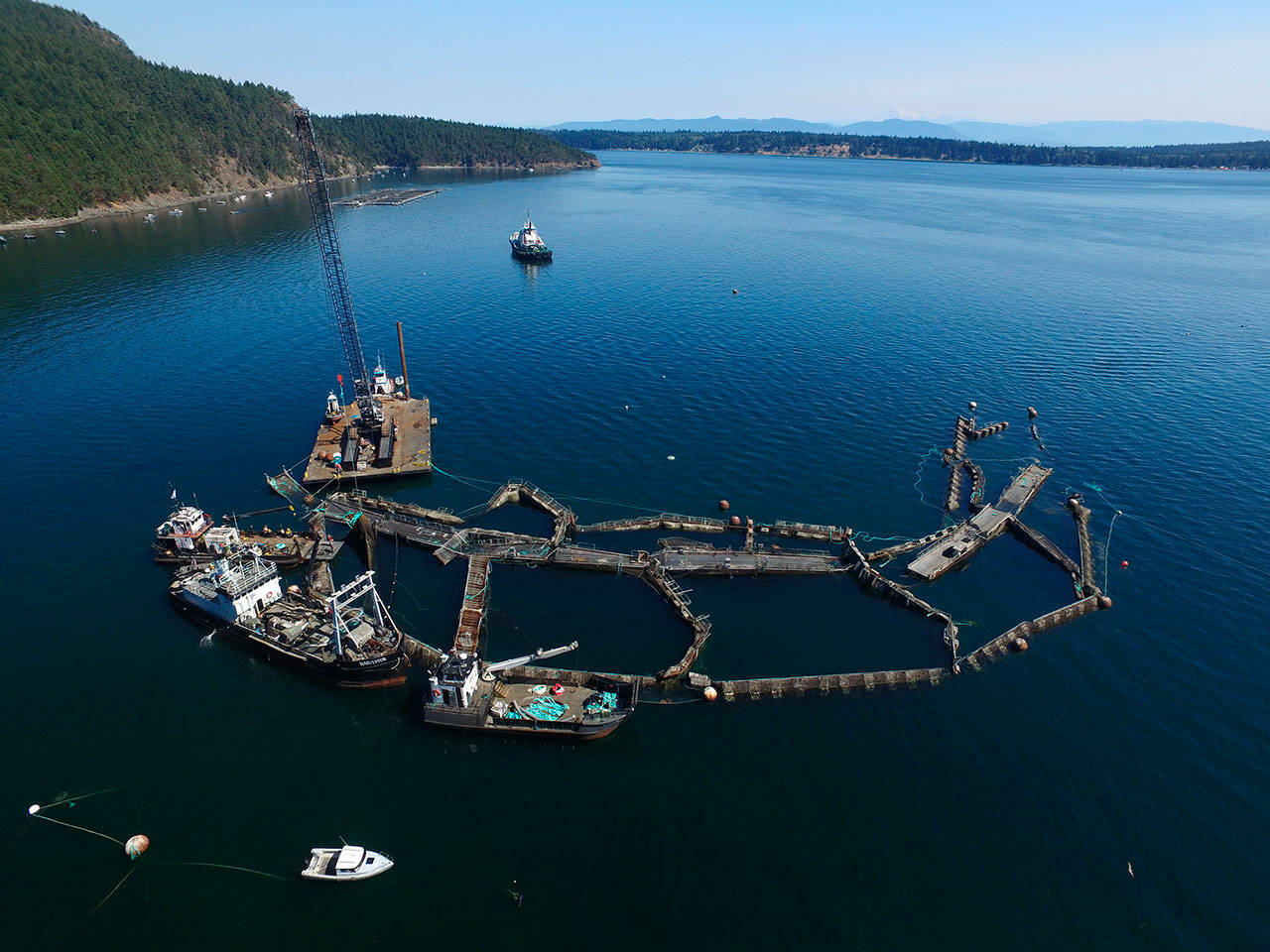By Isabella Breda / The Seattle Times
SEATTLE — No more Cooke Aquaculture fish farms in Puget Sound.
That’s the message the state Department of Natural Resources delivered Monday morning when the agency decided not to renew the last of the fish-farming company’s leases on net pens here.
The company’s last net pens in Puget Sound are located in Rich Passage near Bainbridge Island and Hope Island in Skagit Bay. Cooke has until Dec. 14 to wrap up steelhead farming and begin deconstructing their equipment, according to DNR officials.
According to letters sent from DNR to the company Monday, Cooke had a history of failing to comply with the provisions outlined in agreements.
Since taking over the leases in 2016, the fish-farming giant had made improvements outside of the leasehold, and other times did them without consent, according to the state’s letters.
Cooke did not comment on the decision, but a representative said the company may do so later.
The decision to cut ties ultimately stems from a 2017 spill of tens of thousands of nonnative Atlantic salmon after a net-pen break at Cypress Island near the San Juans.
Then, the New Brunswick, Canada-based company vastly underreported the number of escaped fish, according to a state investigation. Cooke leaders initially blamed the spill on strong tides tied to the solar eclipse. The claim was debunked.
Investigators found as many as 263,000 of the farm’s fish escaped, not the 160,000 Cooke told the public. The farm held a total of more than 300,000 fish weighing some 3 million pounds. Months after the spill, more than 200,000 were still reportedly unaccounted for.
After the net-pen collapse, Hilary Franz, the state public lands commissioner, ordered inspections of Cooke’s facilities.
Cooke then lost its lease to operate its Port Angeles Atlantic salmon farm after an inspection revealed the farm was not adequately maintained and was outside its leasehold boundaries. Cooke challenged the decision in court, but a Thurston County Superior Court judge ruled in favor of state regulators.
The state Legislature in 2018 passed a law effectively phasing out net-pen farming of exotic species in Washington waters. Cooke has since pivoted to raise steelhead.
DNR determined that Cooke’s operations could pose risks to the state’s natural environment, each of the letters states.
Feeding fish in concentrated areas releases nutrients and organic matter that can contribute to algae production, state officials wrote. And fish poop can degrade the environment on the ocean floor.
There’s also a risk of attracting and trapping wild populations; and the risk of escapes are a reality of fish farming, the state wrote.
“Despite years of litigation — and a company that has fought us every step of the way — we are now able to deny lease renewals for the remaining net pen sites,” Franz said in a statement. “Today, we are returning our waters to wild fish and natural habitat. Today, we are freeing Puget Sound of enclosed cages.”
The 2017 incident sparked an outcry to shut down nonnative fish farming in Washington, with 20 Western Washington treaty tribes at the forefront.
The escape threatened the state’s already weak stocks of native Pacific salmon and treaty fishing rights, said a 2017 statement from the Northwest Indian Fisheries Commission.
DNR cited opposition to the fish farming from the Swinomish and Suquamish tribes. Rich Passage is part of the Suquamish Tribe’s fishing grounds.
Swinomish leaders told DNR the Hope Island net pens were adversely impacting fish and fish habitat in Skagit Bay; and the pens were located near Lone Tree Point, a sacred cultural area for the tribe.
“Swinomish are the People of the Salmon, and fishing has been our way of life since time immemorial,” Swinomish tribal community chairperson Steve Edwards wrote in an email. “Cooke’s net pens have interfered with the exercise of our treaty rights for far too long. We look forward to the day when the Hope Island net pen facility will be a distant memory.”
“A big nightmare”
Months after the 2017 spill, the nonnative fish were migrating up some area rivers — more than 40 miles deep in the Skagit. They swam north into British Columbia, and south past Tacoma.
At Lummi Nation, Jay Julius recalls he climbed out of bed and hopped on a boat day after day for weeks on end in an attempt to clean up the spill. Looking back, the days blend together.
Julius, a lifelong fisherman, and others made their way around the island on boats, finding pockets and bays where schools and stragglers were swimming around, confused. Fishers tried to follow the tide, but the fish proved hard to find.
The farm fish would swim in circles, like they had in their pens. Fishers found they could throw pebbles — resembling the farm’s fish food — in the water and round them up, Julius said.
He had caught upward of 20,000 pounds of the fish.
Fishers scooped up thousands of the fish in an attempt to mop up the spill like the ecological hazard it was deemed to be.
The nonnative salmon were handed out to any willing takers in trash bags. Others sat still in garbage cans.
“It was obviously a nightmare,” he said. “Usually you’re excited to see fish. We are excited to see that amount of fish in one spot. But in this case, it was just a big nightmare.”
Commercial salmon farming began in Puget Sound more than three decades ago. Atlantic salmon — the most commonly farmed type of salmon worldwide — was most Washington farmers’ pick.
The Hope Island lease expired in March and has been in month-to-month holdover status since. The Rich Passage lease expired in November.
Commissioner Franz is expected to announce new net pen policies for all of the state’s aquatic lands at a Bainbridge Island news conference Friday morning.
Talk to us
> Give us your news tips.
> Send us a letter to the editor.
> More Herald contact information.

























